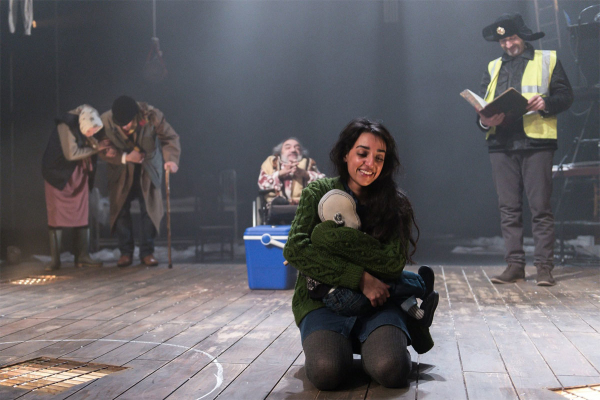The Caucasian Chalk Circle (Unicorn Theatre)

© Manuel Harlan
Brecht’s plays are so layered with symbolism and enriched with moral lessons that it’s no surprise production companies have consistently found new ways of interpreting them.
The Caucasian Chalk Circle, first staged in 1948, is typical of the so-called "epic theatre" that Brecht helped to popularise. It tells the parable of a peasant girl, Grusha, who takes on the tall task of raising somebody else’s child. But the child is no ordinary one; it is the heir to vast power and wealth, negligently abandoned by the wife of a ruler after he was slaughtered in a coup.
Grusha looks after the noble born child as if it were her own, as she goes on the run from rebels determined to track the boy down in order to obtain a rich reward from the coup’s terrifying leader Arsen Kazbeki.
Only when the bitter civil war is over does the former ruler’s wife, Natella, rear her head, demanding Grusha return her son.
The second half of the play focuses on the trial between Natella and Grusha in which the judge famously decides the "true" mother by drawing a chalk circle, placing the boy in the middle and telling the two women that the victor is whoever can pull him out of the circle first.
As the play’s cast explains in an introductory discussion with the audience, in place of the oft-omitted original prologue, the play is about ownership and who has the right to lay claim on the world’s goods.
Nabil Shaban, who plays Azdak the judge, highlights how the richest one percent own 49 percent of the world’s wealth and explains how Brecht was a Communist whose works frequently challenged the nature of capitalist society.
His portrayal of the malevolent turned benevolent judge is profound and touching as he takes on the Wisdom of Solomon in the biblically inspired closing stages of the play.
The relatively small cast must portray different characters in the epic world. Kiran Sonia Sawar is simply brilliant as Grushna. Mia Soteriou does a great job in playing a huge variety of women and Caleb Frederick, who plays the soldier protagonist, has a wonderful turn as a drunken monk.
Special mention should also go out to the play’s crucial narrator The Speaker (Dom Coyote) who brings the play to life and drags the music well and truly into the 21st century, performing everything from heartfelt singing via gentle guitar strums to, believe it or not, punk.
This production, directed by Amy Leach, is possibly one of the greatest introductions to The Caucasian Chalk Circle as it decodes a potentially very difficult play stupendously well.
Let’s hope Unicorn Theatre, which specialises in productions aimed at younger audiences, will take on the challenge to produce more tough plays for the enjoyment of us all and not just beard stroking academics, theorists and philosophisers.










